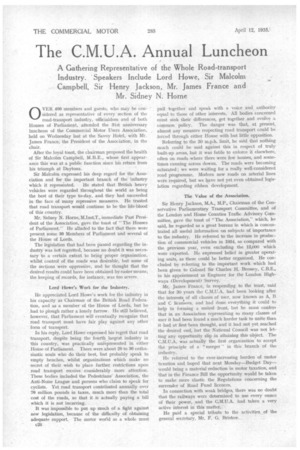The C.M.U.A. Annual Luncheon
Page 48

If you've noticed an error in this article please click here to report it so we can fix it.
0 VER 400 members and guests, who may be considered as representative of every section of the road-transport industry, -officialdom and of both Houses of Parliament, attended the 31st anniversary luncheon of the Commercial Motor Users Association, held on Wednesday last at the Savoy Hotel, with Mr. James France, the President of the Association, in the chair.
After the loyal toast, the chairman proposed the health of Sir Malcolm Campbell, M.B.E., whose first appearance this was at a public function since his return from his triumph at Daytona.
Sir Malcolm expressed his deep regard for the Association and for the important branch of the industry which it represented. He stated that British heavy vehicles were regarded throughout the world as being the best of their type to-day, and they had succeeded in the face of many repressive measures. He trusted that road transport would continue to be the life-blood of this country.
Mr. Sidney N. Horne, M.Inst.T., immediate Past President of the Association, gave the toast of " The Houses of Parliament." He alluded to the fact that there were present some 30 Members of Parliament and several of the House of Lords.
The legislation that had been passed regarding the industry was not regretted, because no doubt it was necessary to a certain extent to bring proper organization, whilst control of the roads was desirable, but some of the sections were oppressive, and he thought that the desired results could have been obtained by easier means; the keeping of records, for instance, was too severe.
Lord Howe's Work for the Industry.
He appreciated Lord Howe's work for the industry in his capacity as Chairman of the British Road Federation, and as a member of the House of Lords, hut he had to plough rather a lonely furrow. He still believed, however, that Parliament will eventually recognize that road transport must have fair play against any other form of transport.
In his reply, Lord Howe expressed his regret that road transport, despite being the fourth. largest industry in this country, was practically unrepresented in either House of Parliament. There were about 20 to 30 enthusiastic souls who do their best, but probably speak to empty benches, whilst organizations which make no secret of their wish to place further restrictions upon road transport receive considerably more attention. These bodies included the Pedestrians' Association, the Anti-Noise League and persons who claim to speak for cyclists. Yet road transport contributed annually over 70 million pounds in taxes, much more than the total cost of the roads, so that it is actually paying a bill which it is not incurring.
It was impossible to put up much of a fight against new legislation, because of the difficulty of obtaining adequate support. The motor world as a whole must
c26 pull together and speak with a voice and authority equal to those of other interests. All bodies concerned must sink their differences, get together and evolve a common policy. The danger was that, at present, almost any measure respecting road transport could be forced through either House with but little opposition.
Referring to the 30 m.p.h. limit, he said that nothing much could be said against this in respect of truly built-up areas, but it was futile to enforce it elsewhere, often on roads where there were few houses, and sometimes running across downs. The roads were becoming saturated ; we were waiting for a really well-considered road programme. Modern new roads on arterial lines were required, but we have not yet even obtained legislation regarding ribbon development.
The Value of the Association.
Sir Henry Jackson, M.A., M.P., Chairman of the Conservative Parliamentary Transport Committee, and of the London and Home Counties Traffic Advisory Committee, gave the toast of "The Association," which, he said, he regarded as a great bureau in which is concentrated all useful information on subjects of importance to the industry. He referred to the increase in production of commercial vehicles in 1934, as compared with the previous year, even excluding the 13,000 which were exported. He expressed belief in greater operating units, as these could be better organized. He conchided by referring to the important work which had been given to Colonel Sir Charles H. Bressey, C.B.E., in his appointment as Engineer for the London Highways (Development) Survey.
Mr, James France, in responding to the toast, said that for 30 years the C.M.U.A. had been looking after the interests, of all classes of user, now known as A, B and C licensees, and had done everything it could to help in forming a united front, but he must confess that in an Association representing so many classes of user it had been found a much harder task to unite than it had at first been thought, and it had not yet reached the desired end, but the National Council was not letting any opportunity slip in attaining this object. The C.M.U.A. was actually the first organization to accept the principle of a " merger " in this branch of the industry.
He referred to the ever-increasing burden of motor taxation and hoped that next Monday—Budget Day—. would bring a material reduction in motor taxation, and that in the Finance Bill the opportunity would be taken to make more elastic the Regulations concerning the surrender of Road Fund licences.
In connection with weak bridges, there was no doubt that the railways were determined to use every ounce of their power, and the C.M.U.A. had taken a very active interest in this matter.
He paid a special tribute to the activities of the general secretary, Mr. F. -G. Bristow.












































































































